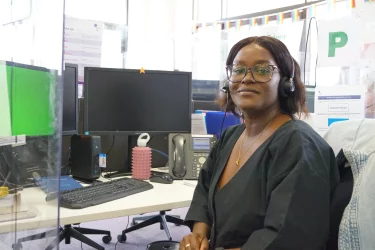
Your Guide to Becoming an NHS 111 Health Advisor: Alvareen’s Insights
Alvareen Davis-Hanger shares her journey and tips for thriving as an NHS 111 Health Advisor at Practice Plus Group.

Alvareen Davis-Hanger shares her journey and tips for thriving as an NHS 111 Health Advisor at Practice Plus Group.
My name is Alvareen Davis-Hanger, and I’m a Health Advisor at NHS 111 in Dorking. After spending 20 years in retail, I joined Practice Plus Group in October 2022, driven by a desire to pursue a career with a more meaningful purpose. I wanted to contribute to society and give back to the NHS, which had supported me as I had experienced some health issues.
Joining Practice Plus Group as a Health Advisor has been one of the best decisions I’ve ever made. The support, training, and sense of purpose I’ve found here are unparalleled. This role has opened up an entirely new world for me, bringing a sense of personal fulfilment.

I’d like to share my thoughts and advice for those considering this role.
When people first hear about the Health Advisor role, they might assume it requires extensive medical knowledge. This isn’t true at all. The necessary knowledge is provided during training, which is well-facilitated. All you need is an aptitude to learn.
Be prepared to handle any type of call. You can never predict the situation of the patient on the other end of the phone. It could be something acute or even an end-of-life situation. It’s important to slow down, approach each patient with empathy, and understand their needs. No two patients are the same.
As we work in shifts, the team members rotate, and you will have the opportunity to meet a lot of amazing people. You will have some time at the beginning of your shift to settle in and catch up, making it easier to build some rapport with your colleagues and adapt to the shift’s dynamic.
You get a 15-minute break at the start of your shift and an additional 10-minute break in the afternoon, as well as an allocated lunch break. You have the flexibility to use your 25 minutes break as needed, which helps sometimes if you need to take a minute for yourself after dealing with a particularly challenging case. I feel recharged when I do, and my manager is always there to support me if I need to speak to someone.
You might feel that the conversations you have with patients are different from what you expected to experience after your training. We cannot predict why people call in, and some might be stressed, frustrated, or unwell, which can lead to challenging interactions. Be aware of this: the key to succeed is not to take their anger or frustration personally. Acknowledge their emotional state, talk to them in a calm and understanding tone and that will help them feel listened to and cared for, which is what we are there to do and what they need
Every experience here is unique, and so is each patient. You will need to adopt a different approach for each call. Helping someone in need brings a deep sense of job satisfaction. While not every day feels like a win, the days that do are incredibly rewarding. I never felt this level of personal accomplishment in my previous role in retail!
You must be fully committed to the role. Give it 100% and take time to learn new things. Working in an NHS 111 call centre might be a bit different from what you expect it to be: you’ll be helping people in need and truly make a difference when they need you the most, every time.
If you have a passion for helping others and a desire to keep learning, then this role might be just the perfect fit for you! You will be surrounded by skilled and driven individuals and will have the opportunity to further grow your career if you so wish.
Unlock your best work life. Explore our vacancies and become part of a team dedicated to making a difference.